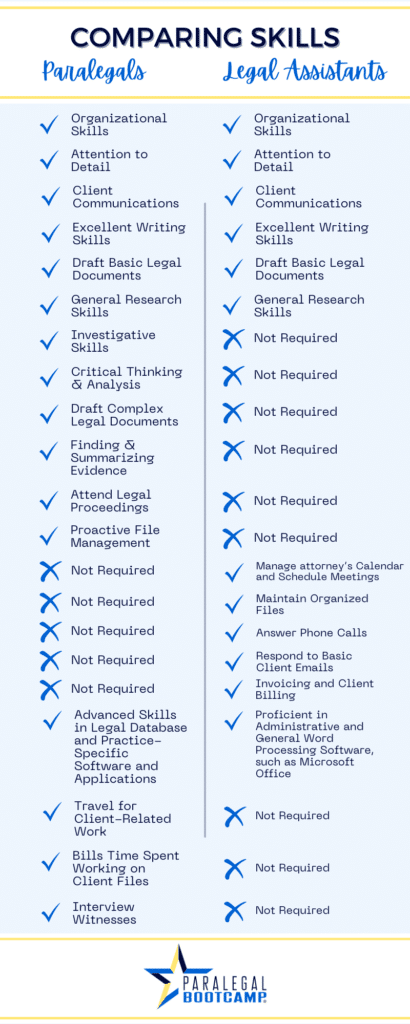What is a Legal Assistant vs. Paralegal?
Can we end the confusion with the use of the legal assistant vs. paralegal job title?
No. Probably not. But let’s try.
Do you know why it’s difficult to end the confusion on those titles? It’s because the ABA keeps changing its definition. It’s also because every law firm has a different definition of what a legal assistant is.
None of the definitions of the paralegal title have ever really changed much. They just keep changing the definition of a legal assistant. So that’s what I want to focus on in this blog.
Listen Below!
The Definition of a Legal Assistant
We’ve got to go way back to 1929 to start to clear up the confusion. Yes, 1929. That was the first association NALS, which back then stood for the National Association of Legal Secretaries. They changed it in 1999 to the National Association of Legal Support Professionals. But let’s go back to when they started in 1929 as an association for legal secretaries.
That’s because back then there really was no such thing as a paralegal. The paralegal profession was born out of legal secretaries who were functioning more like paralegals. And truth be told, I suspect some of it was born out of attorneys wanting to be able to bill for some of the things that their smart secretaries were doing on client files.
Then NFPA came along in 1974 and NALA in 1975. NALA is the National Association of Legal Assistants. Now they call themselves NALA, the Paralegal Association and they’ve changed their certification designation from CLA to CP.
Learn more about mentoring legal assistants.
The Definition of a Paralegal
Back when NALA was the National Association of Legal Assistants, the ABA’s definition of a paralegal and their commentary was that the terms legal assistant and paralegal were used interchangeably. In other words, a paralegal and a legal assistant were the same thing.
That was at a time when law firms had legal secretaries. Times are changing. Well, I should say times have been changing. It started a decade or two ago when law firms were having hard times filling the secretary positions. So they started creating these hybrid positions and called them legal assistants. They could bill for some of their time, but they primarily did administrative tasks that a legal secretary used to do. It was easier to fill the positions with the title legal assistant.
I remember sitting in an HR meeting in 2009 and everyone was saying “we have to restructure the legal secretary role because the younger generation doesn’t want to be called a secretary.” Also, the new generation of associates were technologically savvy and didn’t need as much traditional secretarial support, so the ratio of secretary or assistant to attorney grew from 1 secretary supporting two or three attorneys to one legal assistant supporting 7 or 8 attorneys (or more).
Then, in 2020 the ABA did a 180. They updated their definition of paralegal to remove the term legal assistant and said, “A paralegal is a person, qualified by education, training or work experience who is employed or retained by a lawyer, law office, corporation, governmental agency or other entity and who performs specifically delegated substantive legal work for which a lawyer is responsible.”
Get inspired by Kim Barrett’s story of her paralegal career growth from receptionist to Director.
Litigation Paralegal Boot Camp
Are you tired of being the Panic Mode Paralegal who spends your days playing whack-a-mole with last-minute rush projects because you’re waiting for someone to show you what it takes to be great litigation paralegal?
This is the only program of its kind that provides litigation paralegals with all of the tools to master litigation cases from the complaint through the trial, and everything in between.
You will be the Confident Case Strategist faster than you ever imagined possible.

NALA's Take on Legal Assistant vs. Paralegal
According to current information on NALA’s website:
NALA realizes that the terms legal assistant and paralegal are used in the United States. NALA recognizes and supports paralegals, regardless of title; however, as an organization, we primarily use the term paralegal.
NALA also states that “the terms legal assistant and paralegal are used interchangeably, much like the terms attorney and lawyer.”
Source: https://nala.org/paralegal-info
It may be that the title is used interchangeably, but that just makes it all that more confusing to the general public, and particularly to a client who sometimes gets billed for time spent with a legal assistant at one firm, but at another firm they get billed for time spent with a paralegal and the legal assistant is answering the attorney’s phone.
Given NALA’s full name is the National Association of Legal Assistants, it might be tricky for them now to have to change the name of their association to coincide with the ABA’s new distinction between a paralegal and a legal assistant. That being said, I do see that NALA doesn’t just call themselves NALA. Whenever you hear someone say NALA, it is almost always followed by the words “the Paralegal Association.” In fact, their logo has that entire phrase in it. It’s NALA – the Paralegal Association.
Here are the benefits to participating in your paralegal association.
Debunking the Confusion
As I start to write an outline for a blog post, the first thing I usually do is google it to see what others are saying about the topic.
Now I know why people are still confused! The very first article I came across was downright wrong. There was no date on it, so I’m not sure why Google ranked it number one in my search results, other than it was from a Florida college. It was in their FAQ for their paralegal certificate program.
Their answer was: “There is no difference.”
Yes, there is a difference between a legal assistant and a paralegal! Prior to the ABA’s clarification on the two roles in 2020, their answer might have been technically correct, but still fundamentally wrong.
Now, it’s dead wrong. Whether you go by what the ABA says or the Association of Legal Administrators (ALA) says legal assistants (PDF, 2.8 MB) “divide their time equally between paralegal tasks, including researching and preparing discovery, and legal secretary tasks, up to and including filing, docketing and assisting their attorney in the practice of law.”
The only definition I could find from the other associations, like NFPA and NALS, were old definitions from many years before the 2020 update from the ABA.

Why Do People Get the Legal Assistant vs. Paralegal Roles Confused?
Because every association is using different definitions or outdated definitions that are prior to the 2020 update.
I think it would be REALLY helpful if all of the paralegal or paralegal-related associations, including NALA, NFPA, and NALS, update their definitions based on their interpretation of the ABA update.
That’s fine if they don’t agree with the ABA; but don’t leave a 2002 (or older!) definition up there to further confuse people.

Free Strategy Guidebook for
New Litigation Paralegals
Are you ready to fast-track your litigation paralegal career?!
Our free guidebook reveals three powerful strategies that will set you up for success in your journey. If you’re ready to seize this opportunity and thrive as a litigation paralegal, sign up below, and get started now!
What are the Different Educational Requirements?
For the educational requirements, let’s assume that we are using the newly-adopted ABA definition of a paralegal role and assume that the legal assistant is an administrative role.
If a law firm uses the titles interchangeably, then it would be the same for paralegals and legal assistants.
Again, just like with the paralegal associations, it would also be helpful for law firms to establish definitions for each role that are consistent with what the ABA wrote.
For Paralegals
Most paralegal positions require a minimum of an associate degree in paralegal studies or a paralegal certificate. Some law firms prefer candidates with a bachelor’s degree and a certificate in paralegal studies.
Can a person ever get a paralegal job without a college degree and a paralegal certificate? Yes. Sometimes. However, the employment opportunities of that person would be significantly less than those of someone who has a college degree and a paralegal certificate.
In fact, in most large AmLaw 200 firms, a paralegal must have those in order to be considered for employment.
Tips for starting a paralegal career without a paralegal certificate.
For Legal Assistants
There really are no minimum education requirements, that is, unless it’s for a firm that’s still using the titles interchangeably.
Find out what you learn in school vs on the job.
What are the Different Skills For a Legal Assistant vs. Paralegal?
Below you can find the skills that overlap and the skills that are not typically required for both paralegals and legal assistants.

Which Role Pays More?
Ah, the million-dollar question (or perhaps the slightly-more-than-minimum-wage question). Typically, paralegals earn a higher salary than legal assistants, particularly if they are working for a law firm or other legal entity that requires an undergraduate degree and a paralegal certificate as part of their employment.
However, this can vary based on experience, education, location, and the size of the law firm.
What Does the Online Paralegal Community Say?
On Quora when asked what is the difference between a legal assistant and a paralegal, someone responded:
It’s like trying to spot the difference between twins, isn’t it?
The main difference between a paralegal and a legal assistant lies in the scope of their responsibilities and the level of independence they have in their work.
Let’s start with the paralegal. Picture them as the legal detective, the Sherlock Holmes of the law firm. They play a crucial role in supporting attorneys by conducting research, drafting legal documents, and even assisting in trial preparation. Paralegals often have a more in-depth knowledge of legal concepts and may even specialize in specific areas of law.
On the other side of the legal coin, we have the legal assistant. Think of them as the right-hand (wo)man to the attorneys. Legal assistants provide vital administrative support, managing schedules, organizing files, and communicating with clients. While they may have some legal knowledge, their primary focus is on administrative tasks to ensure the smooth operation of the law office.
I think that’s a good explanation of the difference between a legal assistant vs. paralegal.

Does the Legal Assistant vs. Paralegal Title Make a Difference?
I want to end with a quote from a former legal secretary at a firm I worked for. This was back when the ABA said the terms were interchangeable, and therefore the firm sent out a memo that said legal secretaries should not be signing firm letterhead with the title Legal Assistant to Attorney XYZ because it was confusing to the clients. Instead they should sign emails and firm correspondence with the actual job title, which was legal secretary.
Some of the secretaries got upset because they thought the title was beneath them based on what they were doing. A senior, very experienced legal secretary said “As long as I get my paycheck every other week, I don’t give a crap if you call me the janitor. My title has nothing to do with the respect and work that I receive from my attorneys.”
Well said.
In the end, you and I can’t really solve the debate or reduce the confusion between legal assistant vs. paralegal titles. Even if we could, the ABA will probably update their definition again in 10 years and we’d be back to square one again. Regardless of title, remember you are an essential part of the team.
Meet the Author

Ann Pearson is the Founder of the Paralegal Boot Camp, and host of the Paralegals on Fire! Podcast Show, and passionate about promoting the paralegal profession.
Ann spent 20 years working as a paralegal manager and a litigation paralegal before opening the Paralegal Boot Camp in 2010.
Ann’s training programs focus on adding immediate value to a paralegal’s career and bridging the gap between what a paralegal learns in school and what they actually do on the job.
Visit the About Us Page to learn more about why Ann started the Paralegal Boot Camp.

























